Bolivians strongly back Morales in recall vote
August 11, 2008 - The Asociated Press
By FRANK BAJAK
LA PAZ, Bolivia (AP) -- Members of the international community on Monday congratulated President Evo Morales for a peaceful vote to ratify his mandate and urged dialogue with his opponents to heal widening divisions in the country.
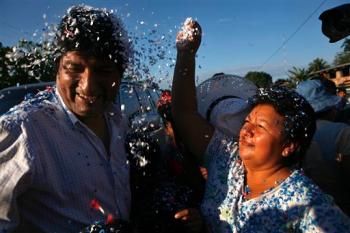 (right) A coca farmer throws confetti over Bolivia's President Evo Morales, left, as he arrives to vote in Villa 14 de Septiembre, in the Bolivian state of Cochabamba, Sunday, Aug. 10, 2008. Bolivians will decide Sunday whether Morales should stay in office on a referendum proposed by the Bolivian leader to try to break a political stalemate in the bitterly divided Andean nation. (AP Photo/Dado Galdieri)
(right) A coca farmer throws confetti over Bolivia's President Evo Morales, left, as he arrives to vote in Villa 14 de Septiembre, in the Bolivian state of Cochabamba, Sunday, Aug. 10, 2008. Bolivians will decide Sunday whether Morales should stay in office on a referendum proposed by the Bolivian leader to try to break a political stalemate in the bitterly divided Andean nation. (AP Photo/Dado Galdieri)
"The table is clean, now the problems should be fixed and the future panorama should be cleared up," said Eduardo Stein, head of the Organization of American States' observer mission in Bolivia.
The U.S. backs efforts by the OAS, the Roman Catholic Church and the international community to promote dialogue in Bolivia, and Washington is ready to offers its assistance, State Department spokesman Robert Wood said Monday.
More than 63 percent of voters in this bitterly divided Andean nation ratified the mandate of Bolivia's first indigenous leader and his vice president, Alvaro Garcia, in Sunday's recall referendum, according to partial unofficial results.
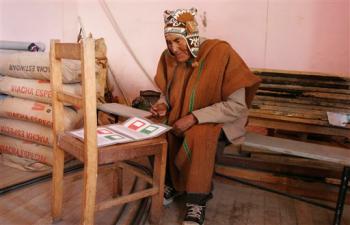 (left) Dinocio Coronel Aymará looks at his empty ballot before deciding his vote in Walata Chico, north of La Paz, Sunday, Aug. 10, 2008. Bolivians will decide Sunday whether Bolivia's President Evo Morales should stay in office on a referendum proposed by the Bolivian eader to try to break a political stalemate in the bitterly divided Andean nation. (AP Photo/ Juan Karita)
(left) Dinocio Coronel Aymará looks at his empty ballot before deciding his vote in Walata Chico, north of La Paz, Sunday, Aug. 10, 2008. Bolivians will decide Sunday whether Bolivia's President Evo Morales should stay in office on a referendum proposed by the Bolivian eader to try to break a political stalemate in the bitterly divided Andean nation. (AP Photo/ Juan Karita)
Eight of the country's nine governors also were subject to recall -- and two Morales foes were among the three ousted, according to a private tally of votes from 1,000 of the country's 22,700 polling stations.
Morales sought the referendum to try to topple governors who have frustrated his bid to improve the plight of Bolivia's long-suppressed indigenous majority, which is concentrated in the country's barren western highlands.
His leftist agenda has met with bitter opposition in the landlocked country's unabashedly capitalistic east, where protesters who accuse him of being a lackey of Venezuelan President Hugo Chavez blockaded airports last week to keep Morales and his ministers from visiting.
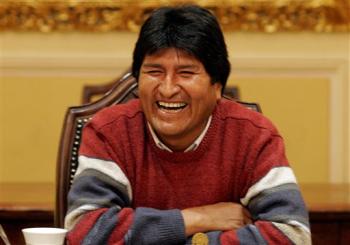 (right) Bolivia's President Evo Morales reacts during a meeting at the presidential palace in La Paz, Bolivia, Sunday, Aug. 10, 2008. Voters strongly reaffirmed their faith in President Morales on Sunday in a recall referendum that the Bolivian leader devised to try to break a political stalemate in the bitterly divided Andean nation, partial unofficial results showed. (AP Photo/Juan Karita)
(right) Bolivia's President Evo Morales reacts during a meeting at the presidential palace in La Paz, Bolivia, Sunday, Aug. 10, 2008. Voters strongly reaffirmed their faith in President Morales on Sunday in a recall referendum that the Bolivian leader devised to try to break a political stalemate in the bitterly divided Andean nation, partial unofficial results showed. (AP Photo/Juan Karita)
All four governors there easily survived Sunday's plebiscite, as expected.
But Morales did surprisingly well in those states. In one, Pando, he was endorsed by 51 percent of voters, while he won 40 percent approval or better in the other three, according to the vote tally by the Ipsos-Apoyo firm for the ATB television network.
First official returns, representing a fifth of the vote, on Monday showed Morales getting 52 percent support. But rural areas where Morales has greater support tend to report more slowly than cities and it could take up to a week before the final results are tallied.
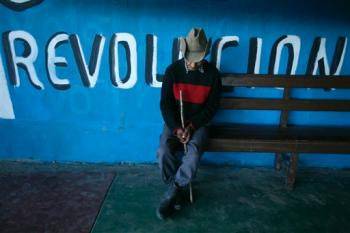 (left) A man takes a nap in front of a graffiti reading in Spanish "Revolution" in Villa 14 de Septiembre, in the Bolivian state of Cochabamba, Sunday, Aug. 10, 2008. Bolivians will decide Sunday whether Morales should stay in office on a referendum proposed by the Bolivian leader to try to break a political stalemate in the bitterly divided Andean nation. (AP Photo/Dado Galdieri)
(left) A man takes a nap in front of a graffiti reading in Spanish "Revolution" in Villa 14 de Septiembre, in the Bolivian state of Cochabamba, Sunday, Aug. 10, 2008. Bolivians will decide Sunday whether Morales should stay in office on a referendum proposed by the Bolivian leader to try to break a political stalemate in the bitterly divided Andean nation. (AP Photo/Dado Galdieri)
"What happened today is important not only for Bolivians but for all Latin Americans," Morales told supporters Sunday night from the balcony of the presidential palace in La Paz. "I dedicate this victory to all the revolutionaries in the world."
As supporters chanted "firm hand," urging him to get tough with his lowland rivals, Morales instead called on all the country's governors to work with him "for the unity of all Bolivians" -- especially in fighting poverty.
Winning office in December 2005, Morales received 53.7 percent of the vote -- at the time the best electoral showing for a Bolivian leader.
The Aymara politician has since nationalized the country's natural gas fields and main telephone company, but the opposition has stymied his attempts to seize fallow eastern lands and give them to impoverished Indians.
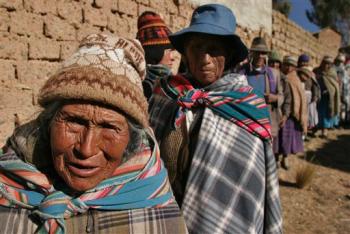 (right) A man takes a nap in front of a graffiti reading in Spanish "Revolution" in Villa 14 de Septiembre, in the Bolivian state of Cochabamba, Sunday, Aug. 10, 2008. Bolivians will decide Sunday whether Morales should stay in office on a referendum proposed by the Bolivian leader to try to break a political stalemate in the bitterly divided Andean nation. (AP Photo/Dado Galdieri)
(right) A man takes a nap in front of a graffiti reading in Spanish "Revolution" in Villa 14 de Septiembre, in the Bolivian state of Cochabamba, Sunday, Aug. 10, 2008. Bolivians will decide Sunday whether Morales should stay in office on a referendum proposed by the Bolivian leader to try to break a political stalemate in the bitterly divided Andean nation. (AP Photo/Dado Galdieri)
Morales has also been unable to get a date set for a nationwide vote on a new constitution that would give indigenous groups more power and allow him to be re-elected to a second five-year term. The opposition walked out of the constituent assembly that wrote the document.
On Sunday, Morales gained with the defeat of opposition governors in the highland province of La Paz and in Cochabamba, seat of his coca-growers movement. An allied governor was ousted in the highlands province of Oruro.
Morales can now name interim governors pending provincial elections.
But that does not mean Bolivia is entering a new era of reconciliation.
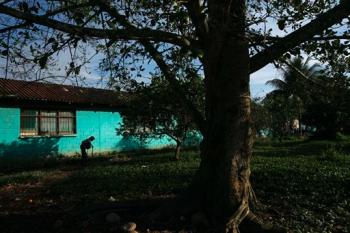 (left) Aymara voters line up to cast their ballots outside a polling station in Walata Chico, north of La Paz, Sunday, Aug. 10, 2008. Bolivians will decide Sunday whether Bolivia's president Evo Morales should stay in office on a referendum proposed by the Bolivian leader to try to break a political stalemate in the bitterly divided Andean nation. (AP Photo/ Juan Karita)
(left) Aymara voters line up to cast their ballots outside a polling station in Walata Chico, north of La Paz, Sunday, Aug. 10, 2008. Bolivians will decide Sunday whether Bolivia's president Evo Morales should stay in office on a referendum proposed by the Bolivian leader to try to break a political stalemate in the bitterly divided Andean nation. (AP Photo/ Juan Karita)
Cochabamba Gov. Manfred Reyes refused to step down, calling the referendum unconstitutional. Bloody street clashes broke out in the province last year when Morales supporters tried to oust Reyes.
Meanwhile, Gov. Ruben Costas of Santa Cruz, the soy-growing lowland center of resistance to Morales, won a strong endorsement in the referendum. He called Sunday's outcome "a defeat for centralism" and said his province now would create its own police force and call elections for a provincial legislature.
Santa Cruz was the first of four provinces -- including Beni, Tarija and Pando -- to declare themselves autonomous this year in what have so far been largely symbolic moves.
The more prosperous eastern provinces have resisted Morales' insistence that the central government control energy profits and decide how to distribute them.
Natural gas and precious metals revenues have boomed since Morales nationalized the gas fields in 2006 and renegotiated extraction contracts. Bolivia now keeps about 85 percent of these profits.
Associated Press writers Carlos Valdez and Paola Flores contributed to this report.